Sport Management News
Reimagining Falk College
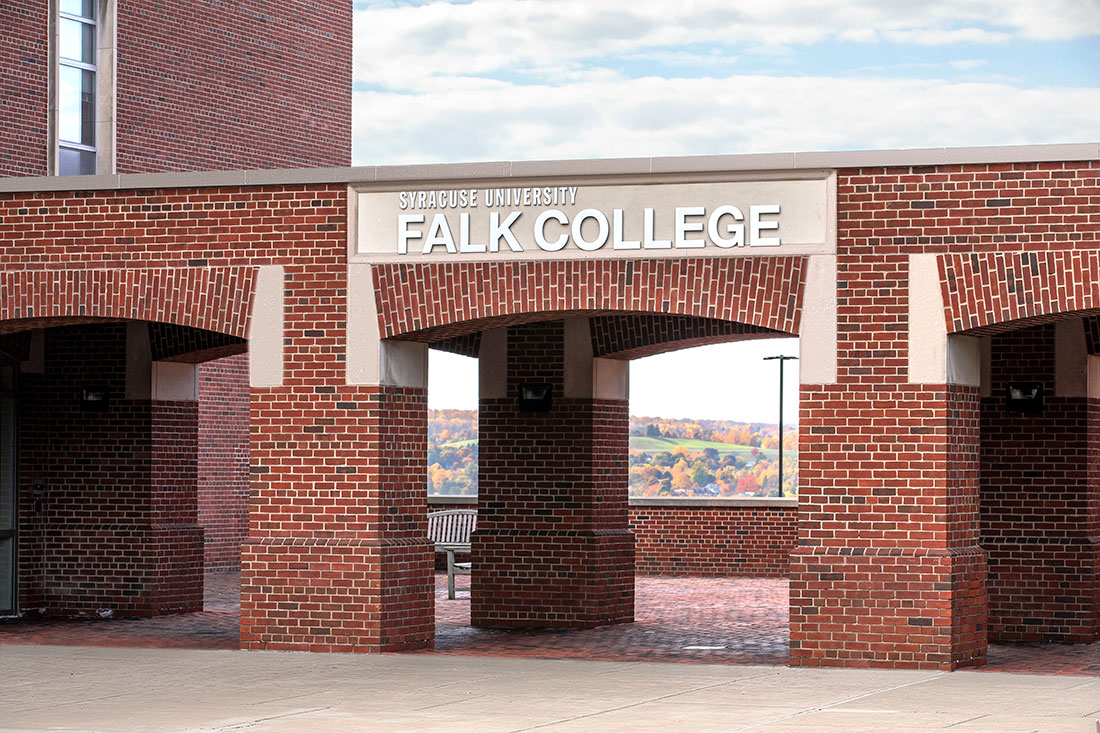
Two decades after the launch of its sport management program, Syracuse University today announced that as a result of its significant growth and academic excellence, the David B. Falk College of Sport and Human Dynamics will become the David B. Falk College of Sport. The first-of-its-kind college will focus exclusively on sport-related disciplines, making the University among the leading academic institutions for preparing students to drive innovation among and lead in sport-related fields and industries.
“Falk College has experienced extraordinary growth, particularly in its renowned sport management program, over the last 20 years, thanks in large part to its innovative faculty and the relentless energy and leadership of former Dean Diane Lyden Murphy,” says Vice Chancellor, Provost and Chief Academic Officer Gretchen Ritter. “With the growth of sport participation domestically and globally, there is unprecedented demand for talented practitioners and leaders. The Falk College of Sport will produce hundreds of students every year who are educated across multiple disciplines and well-prepared to lead in the burgeoning sports field.”
Reimagining Falk College
Since launching its sport management program in 2005 and later adding programs in sport analytics and esports communications and management, Falk College has achieved prominent status as a national leader in sport education. This transformation will make Falk College the first standalone college on an R1 campus that specifically focuses on sport through a holistic academic lens.
Dean Jeremy Jordan, who was appointed last July, says this transformation will expand and enrich sport scholarship at Syracuse.
“Syracuse University has long been a leader in the development of sport-related programs,” says Jordan. “From creating the first-ever sports analytics program to the recent launch of an esports major, the University and Falk College have demonstrated the value of and important role sport plays in the day-to-day lives of people, and not just elite athletes. This reimagination of Falk College is a bold step in solidifying Syracuse University as the preeminent institution for sport-related academic study in the country.”
The reimagined Falk College of Sport will house academic programs in sport management, sport analytics, exercise science, nutrition and, jointly with the Newhouse School, esports. It will focus on four areas of academic excellence: Sport Business, Human Performance, Sport Technology and Innovation, and Community Sport and Wellness. The college will also launch a new research institute focused on sport, which will leverage an interdisciplinary, cross-campus approach to drive innovation in sport and health outcomes and integrate expertise in business, digital media, and technology, among other areas of academic focus. It may include creating new or expanding partnerships among the University’s schools, colleges and academic units, such as the S.I. Newhouse School of Public Communications, the Whitman School of Management, the Maxwell School of Citizenship and Public Affairs, the College of Law and others.
Today’s announcement follows a months-long exercise during which a Sport Management Task Force, consisting of faculty, staff and academic leaders, was charged with identifying ways to enhance and extend Falk’s excellence in sport-related programs. The task force, co-chaired by Jeff Rubin, senior vice president for digital transformation and chief digital officer, and Jamie Winders, associate provost for faculty affairs, submitted a report to Provost Ritter earlier this academic year. Recommendations outlined tangible action the University can take to connect, align and integrate teaching and research related to sport across the academic enterprise.
“The task force concluded that there is a timely opportunity for Falk to build on its strengths and capitalize on relevant marketplace trends,” says Rubin. “As someone who has worked in this space for nearly three decades, there is no better time for Syracuse University to take this bold step than now. Organizations across the country and around the globe are looking for career-ready talent. Falk College is poised to meet that need.”
The work happening in Falk College aligns with the University’s commitment to applying an entrepreneurial and innovative philosophy to elevating sport across the campus. In addition to enhancing sport-related academic opportunities, the University has also taken steps in recent years to widen the availability of esports–academically and recreationally—and has grown current and created new club sport programs.
Shaping the Future of Human Dynamics
As part of the Falk transformation, Syracuse University will invest in a strategic reimagination of human dynamics academic programs with the goal of positioning them for future success and impact. To support this work, Provost Ritter will convene a Human Dynamics Task Force, consisting of academic leaders, department chairs and program directors, faculty, alumni and community partners. The task force will be charged with reviewing the college’s human dynamics programs and identifying future pathways for their growth and success. These academic programs include human development and family science, marriage and family therapy, public health and social work. Students enrolled in these programs and beginning at Syracuse University in Fall 2024 will not be impacted by the University’s reimagination of its human dynamics portfolio.
Provost Ritter says given the increasingly complex public health landscape and the growing global need for health and human services and credentialed professionals, the time is right to reimagine these longstanding academic programs to meet emerging demands in their fields.
“The Human Dynamics Task Force will determine prospects for expansion, innovation and alignment with the University’s overall Academic Strategic Plan, ‘Leading with Distinction,’” says Ritter. “These programs have a deep history at Syracuse University and have had a profound impact on the City of Syracuse, Central New York and communities around the globe. The faculty who teach and research in these disciplines will have the opportunity to review, reimagine and shape the future of the programs with the full support of the University.”
Provost Ritter has asked Associate Provost for Academic Affairs Lois Agnew and newly-appointed Associate Dean for Human Dynamics Programs Rachel Razza, associate professor and previously chair and graduate director in the Department of Human Development and Family Science, to lead and guide the reimagination of the human dynamics programs. The task force will be supported by an external consultant to help it execute on its charge. Additionally, given the significant synergy between the programs and the City of Syracuse and Onondaga County, Syracuse Deputy Mayor Sharon Owens and Deputy County Executive for Human Services Ann Rooney have also agreed to serve on the task force.
“I am grateful to Lois, Rachel, Deputy Mayor Owens and Deputy County Executive Rooney for their willingness to collaborate on this important work, and I look forward to partnering with the other members of the task force,” says Provost Ritter. “These areas of academic excellence are not only central to our University’s mission but also critical to the communities, particularly those who are currently underserved, that our students will eventually serve as the next generation of social workers, therapists, public health professionals and human services providers.”
The Human Dynamics Task Force will receive its charge from Provost Ritter by the end of the spring semester. It will begin its work in earnest over the summer and submit its findings to the provost by the end of October.
An SU News story originally published on April 15, 2024.
Three for One
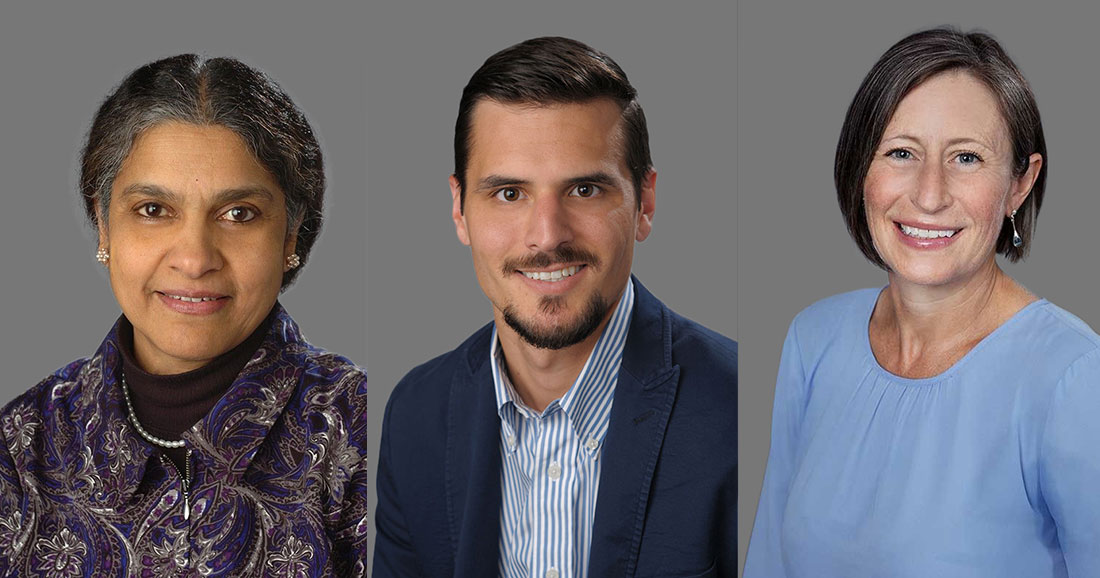
“Every year, we come together to celebrate the outstanding contributions and tremendous success of our students, faculty, staff and broader community,” says Chancellor Kent Syverud. “The accomplishments of this year’s recipients reinforce what it means to be Orange. This ceremony also shines a bright spotlight on the work being done around campus, much of which happens behind the scenes. I thank the many members of our community who organized this event and look forward to recognizing this year’s winners.”
Two major awards—the Chancellor’s Medal and the Chancellor’s Citation for Excellence—will be bestowed. The ceremony will also include the presentation of the Student-Athlete Award, Judith Seinfeld Scholarship, Meredith Professorship for Teaching Excellence, Teaching Recognition Award, Diversity and Inclusion Award, William Pearson Tolley Medal for Distinguished Leadership in Lifelong Learning and Chancellor’s Forever Orange Award.
Emeriti faculty who retired in 2023 and employees who celebrated years of service milestones in 2023 will also be recognized. This year’s University Scholars, Senior Class and School and College Marshals, and Remembrance and Lockerbie Scholars will also be honored.
All members of the University community are invited and encouraged to attend. A reception will follow in the lobby of the Heroy Geology Laboratory.
American Sign Language (ASL) interpretation and Communication Access Realtime Translation (CART) will be provided at the ceremony. For questions about accessibility or to request accommodations, contact Gabe Coleman at gbcolma@syr.edu.
Award Recipients
The Chancellor’s Medal is the University’s highest honor and is awarded to individuals in honor of their trailblazing and extraordinary contributions to the University, to an academic body of knowledge or to society. This year’s recipient is Shiu-Kai Chin, Laura J. and L. Douglas Meredith Professor for Teaching Excellence and professor of electrical engineering and computer science in the College of Engineering and Computer Science.
The Chancellor’s Citation for Excellencerecognizes individuals who have made outstanding contributions in four overarching categories:
- The award for Excellence in Student Research recognizes students who have engaged in collaborative research that has the potential to make a deep and lasting impact on greater society. This year’s recipients are Jingjing Ji, a doctoral candidate in chemical engineering in the Department of Biomedical and Chemical Engineering in the College of Engineering and Computer Science (graduate), and Ashtha Singh, an international relations major in the Maxwell School of Citizenship and Public Affairs and citizenship and civic engagement major in the Maxwell School (undergraduate).
- The award for Outstanding Contributions to the Student Experience and University Initiatives acknowledges faculty and staff who, through their work, enhance the undergraduate experience for students or make invaluable contributions to supporting and advancing the University’s mission and goals. The recipients are Charisse L’Pree Corsbie-Massay, associate professor of communications in the S.I. Newhouse School of Public Communications (faculty); Maureen Casey, chief operating officer for the D’Aniello Institute for Veterans and Military Families (professional staff); Amy Schmidt, program coordinator of citizenship and civic engagement in the Maxwell School (professional staff) and Jolanta Niwelt, events coordinator at Lubin House (support staff).
- The Faculty Excellence and Scholarly Distinction award is intended for faculty members who are collaborators in work of intellectual richness that has the potential for future impact. The work of these nominees offers possibilities for collaboration within the University and outside in partnership with others. This year’s honorees are Wayne Franits, Distinguished Professor in the Department of Art and Music Histories in the College of Arts and Sciences, and Katherine McDonald, associate dean of research and professor of Public Health in the Falk College of Sport and Human Dynamics.
- Chancellor’s Citation for Excellence, Lifetime Achievement Award. This award honors those who have made extraordinary contributions toward advancing all four pillars of excellence over the arc of their careers while at Syracuse University and beyond. This year’s recipient is Shobha Bhatia, Laura J. and L. Douglas Meredith Professor for Teaching Excellence and professor of Civil and Environmental Engineering in the College of Engineering and Computer Science.
The other awards to be presented are:
- The Student-Athlete Award recognizes the top female and top male student athletes and are presented to the senior student-athletes with the highest cumulative grade point average over the course of their academic and athletic careers. This year’s recipients are Izabela Krakic, an international relations major in the Maxwell School of Citizenship and Public Affairs and College of Arts and Sciences and member of the women’s rowing team, and Julius Rauch, an entrepreneurship and emerging enterprises major in the Whitman School of Management and a member of the men’s soccer team.
- Seinfeld Scholarship: Each year Syracuse University honors the talents of outstanding faculty or students through an award made possible by Judith Greenberg Seinfeld ’56, a distinguished alumna and member of the University Board of Trustees. Awards are made to those who have been determined by their peers to have made outstanding contributions to the beauty of the world, to have added to human values and to ending human abuse anywhere in the world, and to have demonstrated passion for excellence, creativity and originality in academic or artistic fields. This year, the designation is bestowed upon a faculty member, Rebecca Ortiz, associate professor of advertising in the Newhouse School.
- The Laura J. and L. Douglas Meredith Professorships for Teaching Excellence were created in 1995 to recognize and reward outstanding teaching among faculty. The 2024-27 Meredith Professors are Joon Park, professor in the School of Information Studies, and Cora True-Frost, Bond, Schoeneck and King Distinguished Professor in the College of Law.
- In 2001, the Meredith Professorship Program was expanded to recognize teaching excellence by non-tenured faculty and adjunct and part-time instructors. Awards are given in two categories: Early Performance and Continuing Excellence. This year’s honorees in the Early Performance category are Kelly Leahy, assistant professor of television, radio and film in the Newhouse School; Farzana Rahman, associate teaching professor of electrical engineering and computer science in the College of Engineering and Computer Science; Milton Santiago, assistant professor of visual communications in the Newhouse School; Darwin Tsen, assistant teaching professor of Chinese and Chinese language in the College of Arts and Sciences; and Nina Wilson, assistant professor in the School of Architecture. The two honorees in the Continuing Excellence category are Kenneth Marfilius, assistant dean of online and distance education and associate teaching professor of social work in the Falk College, and Sudha Raj, teaching professor and graduate director of nutrition and food studies in the Falk College.
- The Diversity and Inclusion Award recognizes an individual who is integral in helping us achieve academic excellence at a university that is welcoming to all through our investments in a diverse, inclusive, accessible and equitable community. This year’s recipient is Suzette Meléndez, teaching professor in the College of Law and faculty fellow for the Office of Strategic Initiatives and the Office of Diversity and Inclusion.
- The William Pearson Tolley Medal for Distinguished Leadership in Lifelong Learning is based in the School of Education and honors national or international leadership in support of lifelong learning. This year’s recipient is Rhodia Thomas ’77, executive director of MidPenn Legal Services, adjunct professor of law at Dickinson University and an alumna of the School of Education.
- The Chancellor’s Forever Orange Award recognizes individual students, faculty or staff who—by virtue of extraordinary hard work, good values and commitment to excellence—have come to embody the best of Syracuse University. This year’s recipients are Colleen O’Connor Bench, associate vice president of parent engagement and student experience, and Ian McIntyre, head coach of the men’s soccer team.
Industry Perspective
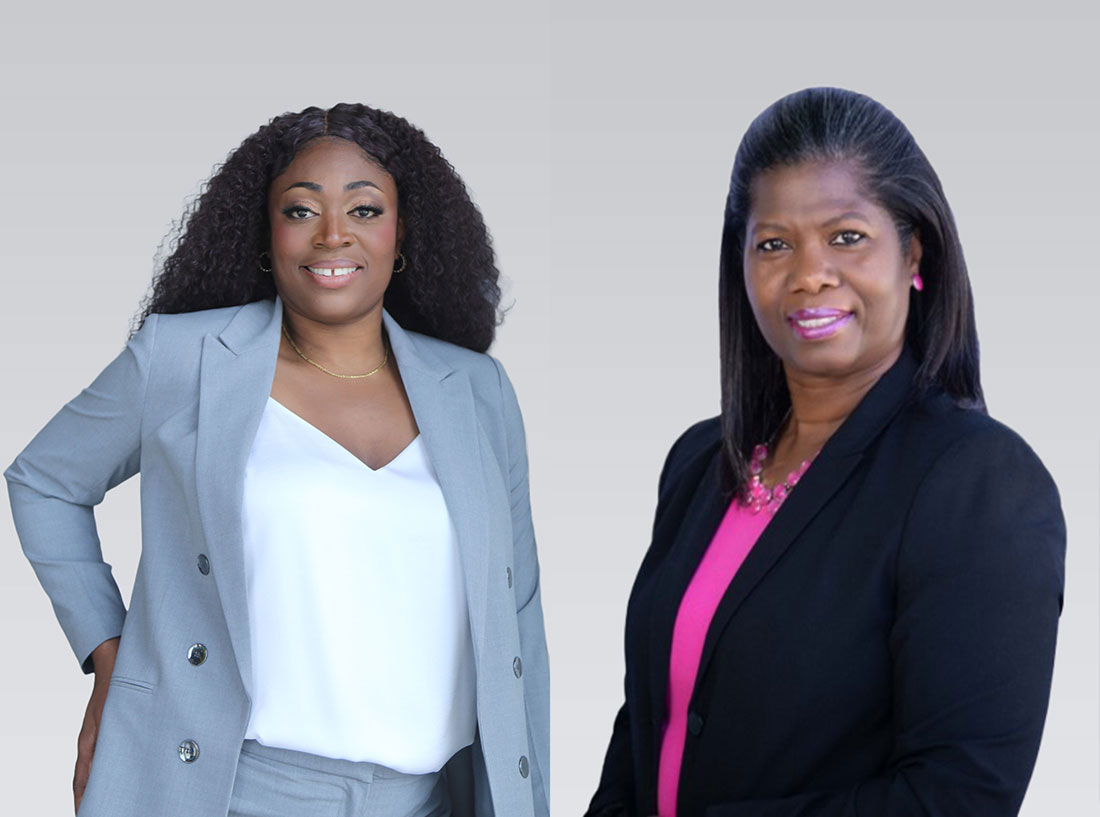
Falk College is pleased to welcome two new board members to the Falk College Advisory Board: Andrea Massop Ramos, MCN, and Tatiana Warren, Ph.D.
The Falk College Advisory Board champions the mission of the college and University to students, alumni, colleagues, and prospective supporters. Board members provide industry perspective and guidance, so Falk students are prepared to enter changing professional fields. They exemplify the values of social responsibility in their citizenship and embody the University’s commitment to diversity and inclusion.
“Falk College is in an exciting season of growth,” says Falk College Dean Jeremy Jordan. “Our primary focus is on elevating the student experience—supporting career readiness through the expansion of purposeful experiential learning opportunities for students. Our Advisory Board plays a crucial role in this effort by bringing insights from a variety of professional disciplines and helping forge corporate and community partnerships. I am confident that Andrea Massop Ramos and Dr. Tati Warren will add valuable contributions in these and other influential ways.”
Andrea Massop Ramos, MCN, is an award-winning clinical nutritionist. After a 20-year career with the airlines, she became the operations manager for Metro North Railroad, where she founded Healthy4U, a Corporate Health and Well Being Group. As an adjunct professor of Clinical Nutrition at New York Institute of Technology, Ramos teaches a required nutrition course for all health professionals. She founded Healthy FRIENDZ Nutrition, LLC, which uses a hands-on culinary platform to teach nutrition education to children and families in a fun, interactive setting. She is also a nutrition consultant for CBS Survivor Productions. Ramos earned her master of science degree in clinical nutrition from New York Institute of Technology.
“Andrea is a clinical nutritionist, private health chef, and entrepreneur,” says Falk College Assistant Dean of Advancement Megan Myers. “We are confident that she will help Falk College expand our connections to the wider community, providing our students with hands-on learning experiences, internships, and job opportunities.”
Tatiana Warren, Ph.D., is a distinguished health equity strategist who established Just TATI, a multimedia initiative to inform and disseminate accurate and evidence-based health topics to diverse audiences. She consults health professionals, community-based organization leaders, educators, and community members in the implementation and evaluation of their health programs. As founder of Just TATI, she works on social justice projects with highly capable and driven organizations that don’t have access to the funding or resources they need to deliver impactful and sustainable community outcomes. She does this by providing access to secure funding and focusing on empowering and elevating local communities.
Warren currently serves as lead Social Scientist Evaluator with Veritas Management Group on projects with The Food and Drug Administration Office of Minority Health and Health Equity and the Centers for Disease Control and Prevention Division of Nutrition, Physical Activity, and Obesity. She also co-leads the Community Engagement and Dissemination Core Advisory Board for the Johns Hopkins Center for Health Disparities Solution.
“As a health equity expert, consultant, and social scientist, Dr. Warren brings a wealth of knowledge and skills related to diversity, equity, inclusion, and accessibility,” says Myers. “As a former Syracuse University track and field student-athlete, she brings a unique perspective to diversity issues among athletes.”
Falk College academic degree programs focus on holistic health and wellbeing, human performance, and sport business enterprise. The college’s signature emphasis on experiential learning supports student success through intentional internship requirements, faculty-mentored research projects, immersion travel, and global study abroad. At every stage of their education, Falk College students engage in meaningful work to advance their disciplines and careers.
Meet all members of the Falk College Advisory Board on the Falk College website.
Exploring Careers
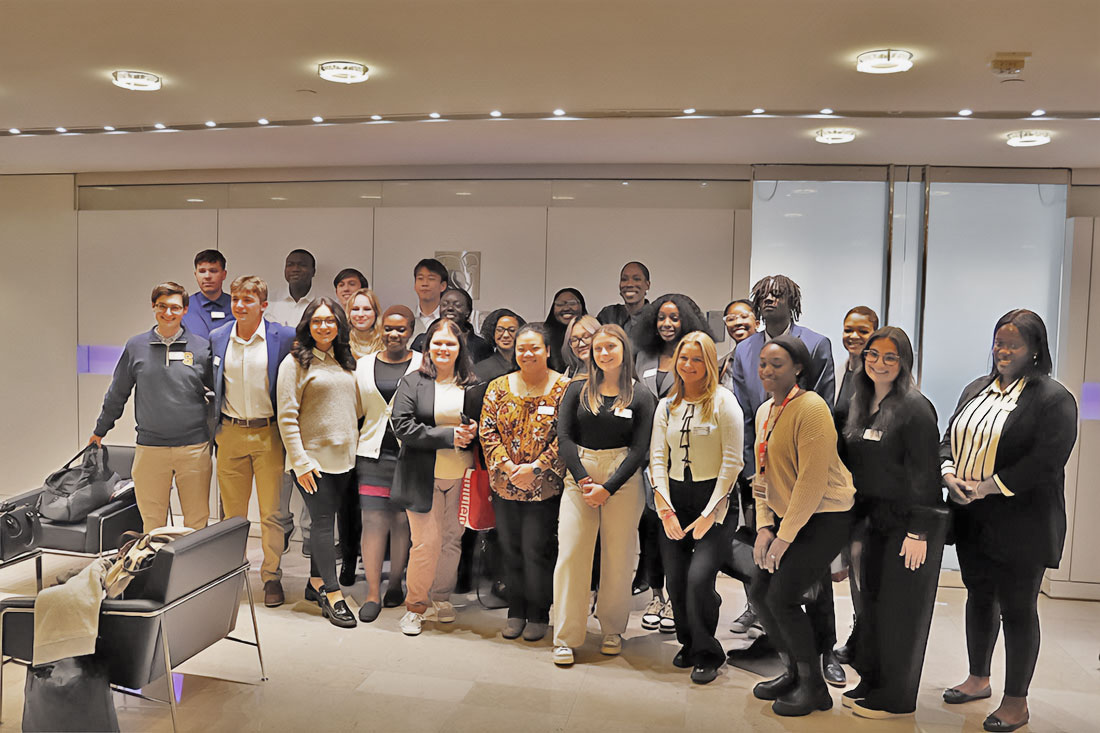
The Falk College of Sport and Human Dynamics at Syracuse University is a unique college with a diversity of programs from Exercise Science to Social Work to Sport Analytics.
The common denominator is Falk’s focus on experiential learning, and this past fall 27 students representing on-campus and online programs from all departments participated in one of the college’s most immersive experiences: the “Falk in D.C. Career Exploration Trip” hosted by the Office of Career Services.
It was the third Falk in D.C. trip, but the first that included separate tracks for health/human services and sport-related careers, with all attending Falk students joining together for select site visits and panels that represented both health and sport professionals. The students engaged with alumni and employer representatives from 28 Washington, D.C., and Baltimore area organizations through site visits and panels, and even more at the alumni networking reception.
“The combined nature of the trip allowed many students to expand their professional interests and discover the overlap between health and sport professions,” says David Sly, associate director of career services. “Over the course of the trip, all attending students demonstrated new or improved ability and confidence in career skills including networking, industry knowledge, communication, and awareness of professional values.”
Health students met with representatives from the FDA, USDA, CDC, Bread for the City, Urban Institute, and MedStar, among many others. Sport students met with representatives from several organizations, including Under Armour, Big League Advantage, Washington Commanders, Monumental Sports and Entertainment, DC United, and Leveling the Playing Field.
All students participated in visits with the NFL Players’ Association, Washington Nationals, Building Bridges Across the River, Living Classrooms Foundation, and PeacePlayers, International.
“The Falk in D.C. Career Immersion Trip gave me the opportunity to learn about the vast array of options that will be there for me post-graduation in the public health field,” says public health major Brinda Parikh ’26. “Being able to hear firsthand from industry professionals about their experiences throughout their careers was very eye-opening, and this trip helped me grow my network of Syracuse University alums that could help me in my own career in the future.”
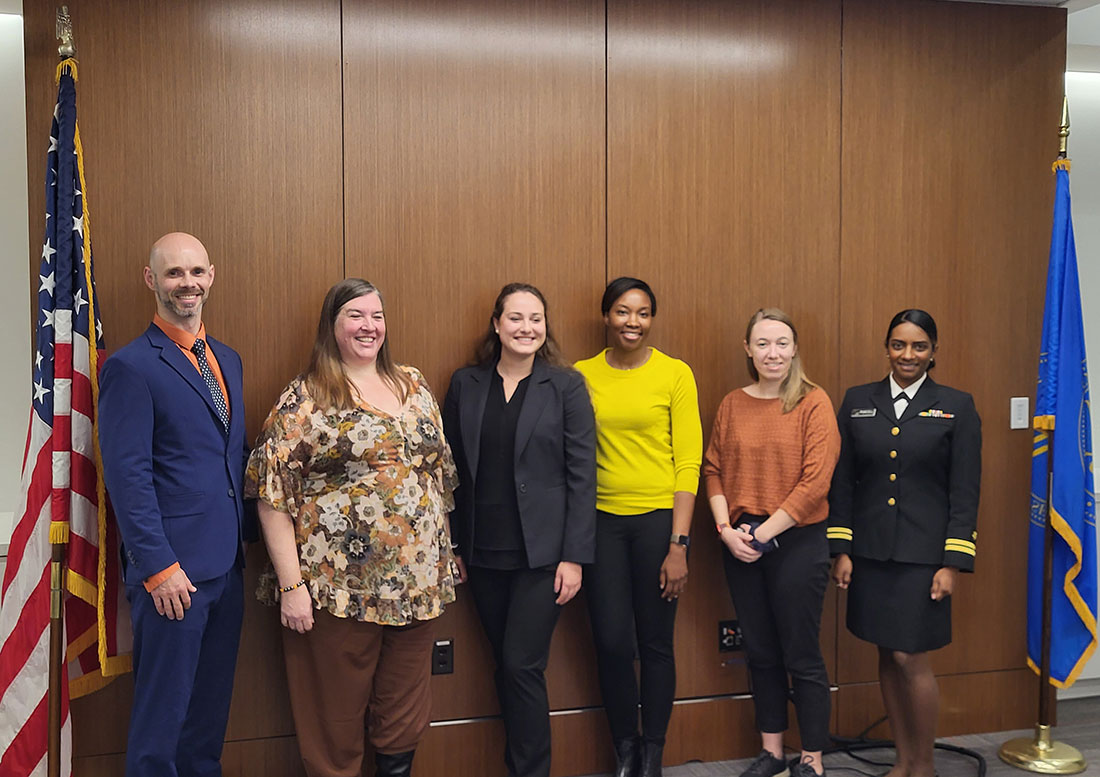
When the students returned from D.C., Career Services asked for their reflections of the trip, how it fit into their decision to attend Syracuse University, and their career goals. Here, we’re sharing responses from five students from across the college: master of social work student Nicole Corrente, public health major Tommy DaSilva ’26, health and exercise science major Alexia Harris ’26, sport management major Brianna Nechifor ’26, and sport analytics major Liam Roberts ’27.
Why did you choose Syracuse University and Falk College?
Alexia Harris: I chose health and exercise science because I have always loved studying the way the body works and moves. I chose Syracuse University because its program is amazing and has already set me up for success in my first semester here.
Tommy DaSilva: I chose both of my majors (public health and policy studies) because I wanted to be able to improve the lives of others through government action or nonprofit community work.
Brianna Nechifor: I chose to become a sport management major because I was encouraged to enter the industry by my tennis coaches and friends who saw my burning passion for sports. I chose Syracuse University because of the community and opportunities that are available to me, including the Sales and Marketing Club, Sport Management Club, and WISE (Women in Sports and Events).
Nicole Corrente: I’m a graduate student of social work who’s originally from Syracuse, so choosing Syracuse University was a natural fit.
Liam Roberts: Outside of school my biggest passion has always been sports and in school I always enjoyed math and working with numbers. As a result, the sports analytics major was perfectly catered to what I am interested in and what I want to do in life. The opportunities this major provides, including ones like this D.C. trip, were not available anywhere else and it’s ultimately why I chose to attend Syracuse.
What are your top three highlights so far from your Syracuse University experience and what are your career goals?
Brianna Nechifor: My top three highlights have to be the introduction of the new esports major, a field that I am very passionate about; the Falk in D.C. Exploration Trip; and the Sport Management Charity Sport Auction (shoutout to the Sales Committee!). My ultimate career goal is to work in esports, possibly in event management.
Nicole Corrente: My top three highlights have been my graduate coursework and research; the Falk in D.C. trip; and all the amazing connections I’ve made along the way. In the future, I plan to have a career in anti-trafficking efforts as a therapist for survivors of trafficking.
Alexia Harris: My top three highlights so far are setting up my internship with strength and conditioning in the athletics complex for next semester; being able to go on the Falk in D.C. trip; and all the different campus opportunities available. My ultimate career goal is either to go into athletic training or sports nutrition.
Liam Roberts: My Syracuse experience has only just begun, so my highlights are likely still to come. But so far, my No. 1 highlight would definitely be this trip, while other great experiences are connecting with Professor (Shane) Sanders and participating in the basketball and baseball analytics clubs.
Tommy DaSilva: Highlights of Syracuse so far have been my service-learning work with International Services and the YWCA; the work done by my organization SAPHE (Student Association of Public Health Education); and the professional connections I have been able to make. I don’t have a specific ultimate career goal as I’m open to any opportunities that come my way, as long as they can be used to help someone in some way.
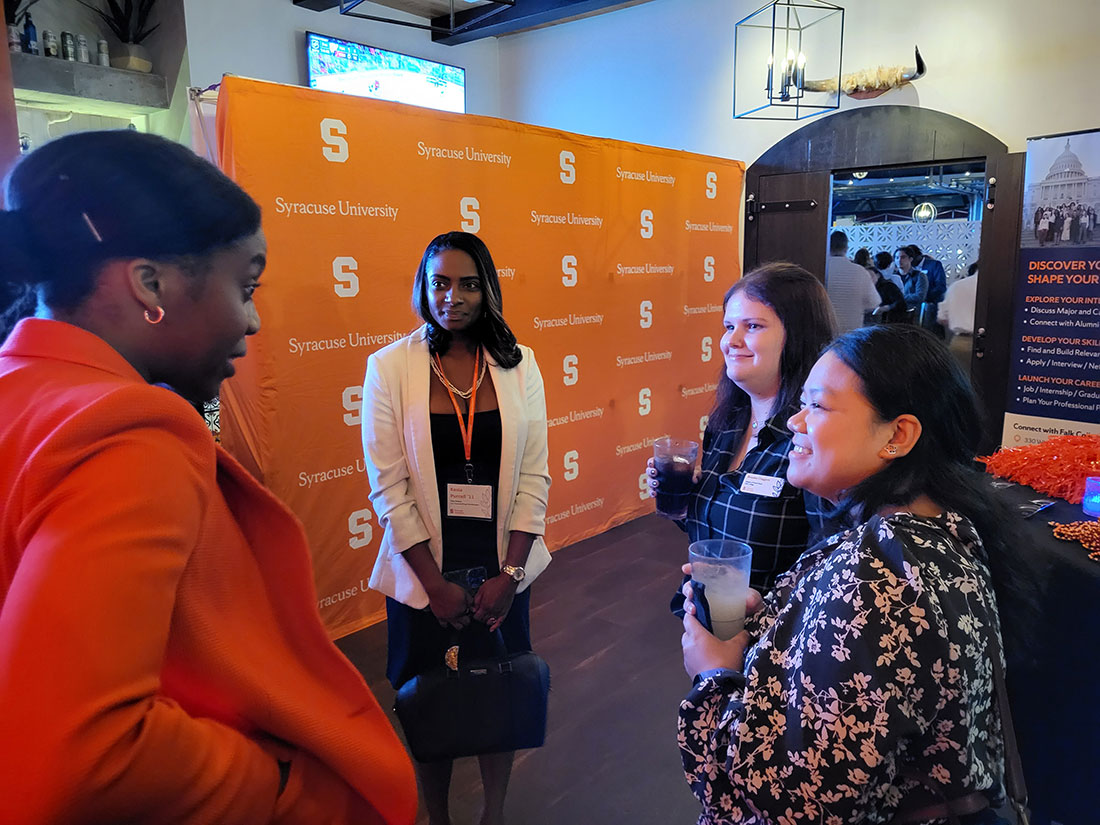
What is your most memorable takeaway from the Falk in D.C. trip?
Liam Roberts: I engaged with and explored exciting opportunities within the sports industry that I would have otherwise never been able to experience, and in a manner that was fun and interesting. This experience was one that I could not see myself getting anywhere else and I’m glad I had the opportunity to join.
Alexia Harris: This trip provided me with exposure to a lot of different employment opportunities and fields that I had never thought about before, as well as connecting me to a wide variety of people.
Tommy DaSilva: This trip gave me insight into potential careers that I would have never thought possible without these face-to-face conversations.
Brianna Nechifor: I was able to interact with a variety of perspectives in the sports industry, even those you may not think you have a connection with them. Everything is in one way connected, and this trip can help shift your opinions on different sectors of the industry. It’s honestly something you shouldn’t be afraid to apply for!
Nicole Corrente: This was an amazing experience! This trip provided me with once-in-a-lifetime opportunities to meet representatives from the CDC, HHS, ACFS, and several nonprofit agencies. Learning about these organizations taught me a lot about the importance of a strong work ethic and an open mind. I look forward to staying connected to the Syracuse University alumni that I met and staying engaged with the work they’re doing in D.C.
Students interested in the “Falk in D.C.” trip in the Fall 2024 semester can watch a video summary of the trip and find Fall 2024 updates on the Falk Careers home page.
‘A True Inspiration’
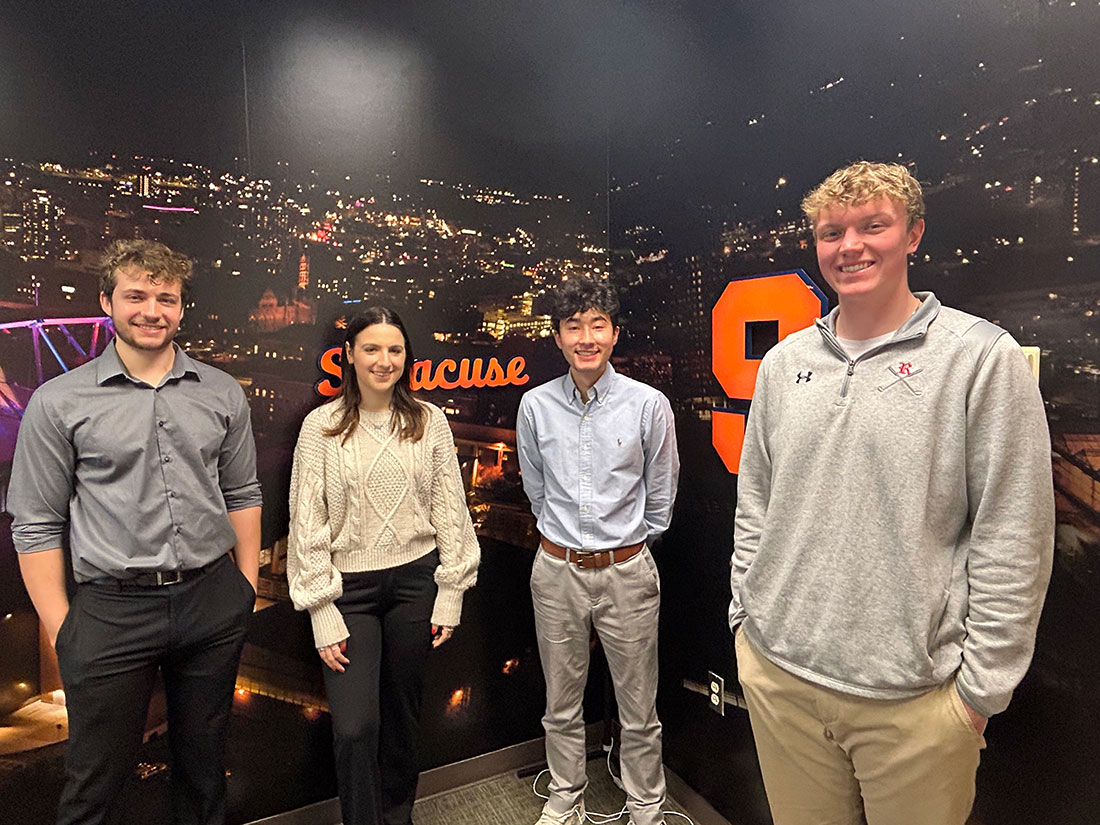
Four students from Syracuse University’s Sport Analytics program will travel to Dallas, Texas, Feb. 21-22 to compete in the AXS National Collegiate Sports Analytics Championship and defend Syracuse’s national title.
Seniors Collin Kneiss, Nicholas Kamimoto, Tyler Bolebruch, and Marissa Schneider will represent Syracuse at the event, which is hosted by the NBA’s Dallas Mavericks at their home arena, the American Airlines Center. The students will compete in the business analytics category; in 2023, Syracuse University won the game analytics category that is not a part of the competition this year.
“They are a true inspiration as they have taken on this challenge, been willing to put themselves in the arena, and continually worked to improve their skills and themselves,” says Rodney Paul, director of the Sport Analytics program and a professor in the Department of Sport Management at the Falk College of Sport and Human Dynamics. “They are role models and leaders to our young students and are incredible representatives of Falk College and Syracuse University.”
The championship in Dallas is the second half of the national competition that includes more than 150 college students from around the country. In the first half, which was held virtually, students were given a prompt and had to prepare and present their analytics work to judges.
“The students in our program are our greatest asset,” says Paul, the team’s coach. “We are so proud of Collin, Nicholas, Tyler, and Marissa and how well they performed and look forward to them demonstrating their abilities on a national stage.”
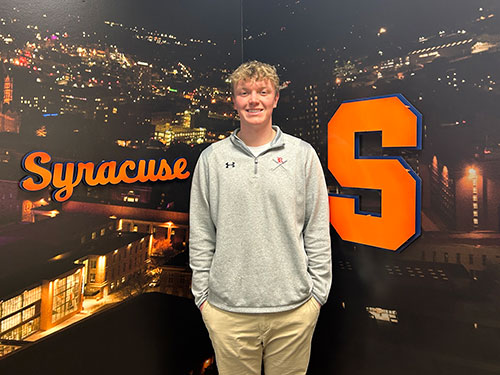
The trip to Dallas is funded through a gift from Syracuse University Trustee and alum Andrew Berlin ’83, who continues to support sport analytics student-focused initiatives.
Before they traveled to Dallas, we asked Kneiss, Kamimoto, Bolebruch, and Schneider questions about representing Falk College and Syracuse University at this national event, their first-round success, and what they expect in the finals. Here’s what they said:
What’s it like to represent Falk College and Syracuse University at this prestigious national event?
Kneiss (sport analytics and economics dual major with a minor in sport management): Being able to represent Syracuse and Falk College has been an amazing feeling. Syracuse has been a great place to be and has helped me in so many ways, so I’m glad to be able to now represent the University.
Kamimoto (sport analytics and economics dual major and sport management minor): It’s an honor to represent Falk, Syracuse, and the Sport Analytics program at the championships. Syracuse has been my home for the past four years, and it feels incredible to finish my time here by competing at the championships. I have learned numerous skills from my professors at Syracuse that I’ll be able to apply during this event.
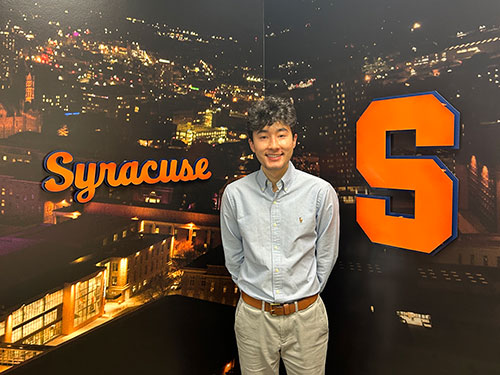
Bolebruch(sport analytics and economics dual major with minors in finance and mathematics): I’m grateful to represent Falk and Syracuse at the national level. I look forward to the four of us having a chance to bring home another trophy for Falk and Syracuse University.
Schneider (sport analytics and economics dual major and sport management minor): I feel incredibly proud that I get to represent Falk, Syracuse, and the Sport Analytics program at the championships. This competition is an experience that I feel very honored to have as not everyone gets to participate in it.
In the first round, can you briefly describe what you did and your reaction when you saw the final standings?
Kneiss: For the first round, we were given data and asked to create a presentation within three days that we eventually presented to two analytics judges over Zoom. When everything was done and I woke up to (congratulatory) emails from many of my professors and advisors, I felt proud of my work and excited that my name was on it.
Kamimoto: In the first round, I created a ticket price-model based on the number of days before an event. I examined how the prices and quantity of tickets purchased changed at all levels of the stadium, depending on whether the tickets were purchased seven days or less before the event or seven days or more before the event. Upon seeing the final standings, I was proud of my achievement and of the entire team as we all finished in excellent positions.
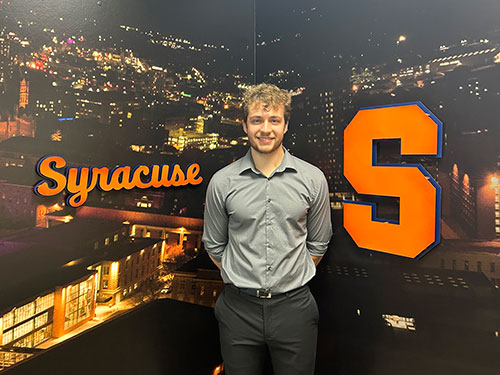
Bolebruch: In the first round, I created models to show how the demand for tickets shifts as the game gets closer. I felt confident about this analysis, and I expected the four of us to do very well, but to see all four of us in the top 20 with all the students that participated was better than I could have hoped.
Schneider: I was extremely proud of myself and, of course, my peers who also placed in the top standings. I have never done something like this before, so I felt proud of my work and I hope to have the same success, if not better, at the championships in Dallas.
How are you feeling about your chances in Dallas, and do you know what assignment you’ll receive at the competition?
Kneiss: I was extremely nervous coming into this competition, but after seeing my qualifying results, I have become confident with my abilities and my chances in Dallas. We know the data will involve recycling and trash data, so I’ve tried to start brainstorming the possibilities of what I can do and hopefully get ahead early.
Kamimoto: I’m feeling good about my chances in Dallas, and I’ll need to continue to put my best work out there. We know that we’ll be working with an energy and sustainability dataset, and I am excited to get there and get started.
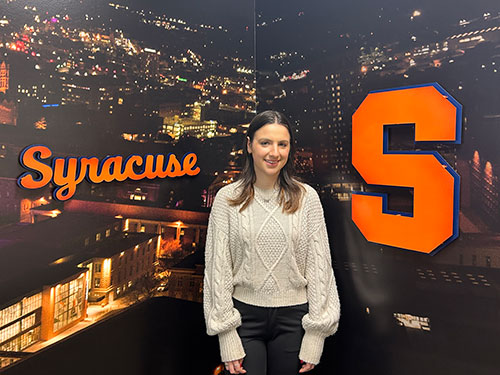
Bolebruch: I feel confident. With our seeding, we have a good chance of finishing as the No. 1 school; now, it’s time to show up and perform. We recently received a study guide and practice dataset for the competition, and it will likely focus on sustainability and energy at different sport venues. So, it will be interesting to see what everyone will come up with for that.
Schneider: I feel confident in my chances, and I also feel confident in the chances of my peers. We have all received a study guide for the championships that says we’ll receive data related to water and waste. The championship is the same format as the virtual rounds as each participant is expected to present a five-minute presentation based on the given prompt that everyone will receive. Each participant is given a few hours to create the presentation that will provide insights for venues to improve sustainability performance.
Students Awarded SOURCE Grants
Sport analytics students Danny Baris, Hunter Kuchenbaur, and Jonah Soos were awarded a Syracuse Office of Undergraduate Research and Creative Engagement (SOURCE) grant for $3,150 for their research on “Promotions in Minor League Baseball: An Analysis Across Leagues.” Sport analytics student Marcus Mann was awarded a SOURCE grant for $2,385 for his research on “Data Driven Insights on Tommy John Surgery.”
Baris, Soos, and Mann will present their research at the NINE Spring Training Conference in Tempe, Arizona, in early March and will use their SOURCE grants to fund their trips. Baris, Soos, and Mann will present their research at the NINE Spring Training Conference in Tempe, Arizona, in early March and will use their SOURCE grants to fund their trips. Kuchenbaur is unable to attend as he is traveling with Syracuse University on an immersion class trip overseas.
High Honors
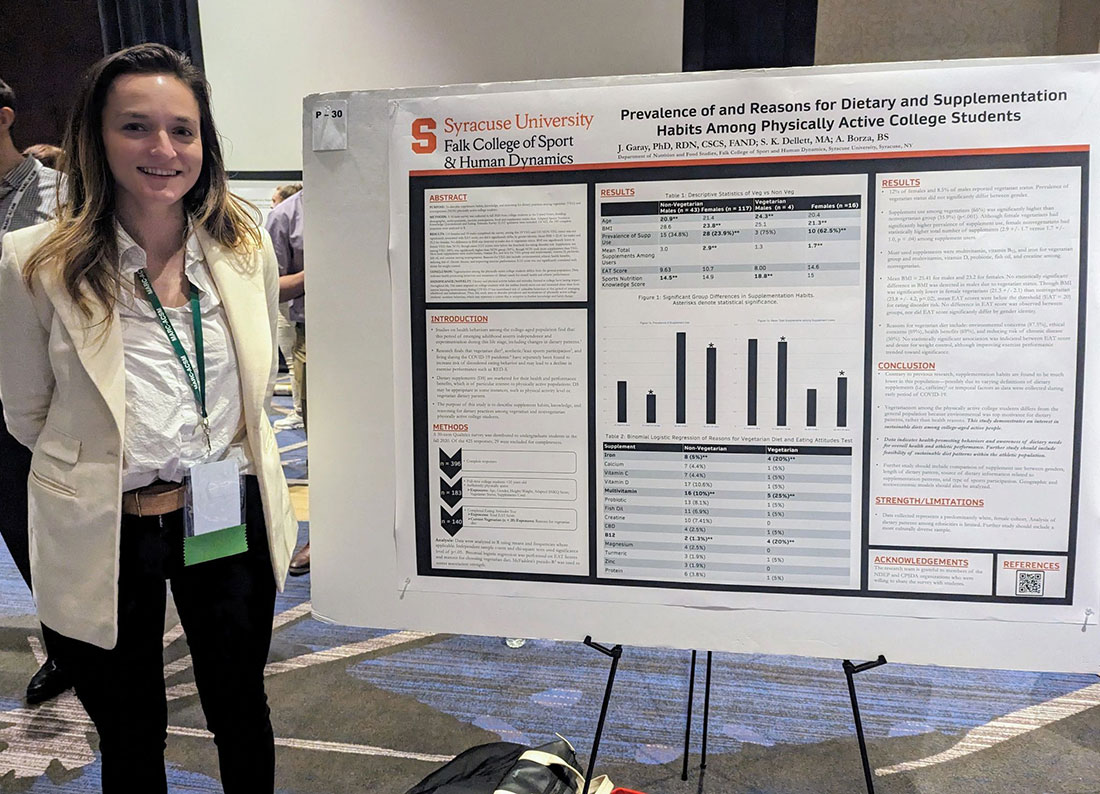
Falk College boasts a robust, collaborative research community in which students play an active role. At Falk, graduate and undergraduate students have the opportunity to work directly with faculty to collect data, analyze findings, and draw conclusions on relevant topics surrounding exercise science, human development and family science, marriage and family therapy, nutrition and food studies, public health, social work, and sport management.
Falk students accompany their faculty research mentors to leading academic conferences across the country, and commonly receive high honors for their accomplishments in research. Danny Baris, Sarah Dellett, and Mingxuan (Jessica) Li are three examples of students who have been recently honored for their research.
We asked them to discuss their research and here’s what they shared:
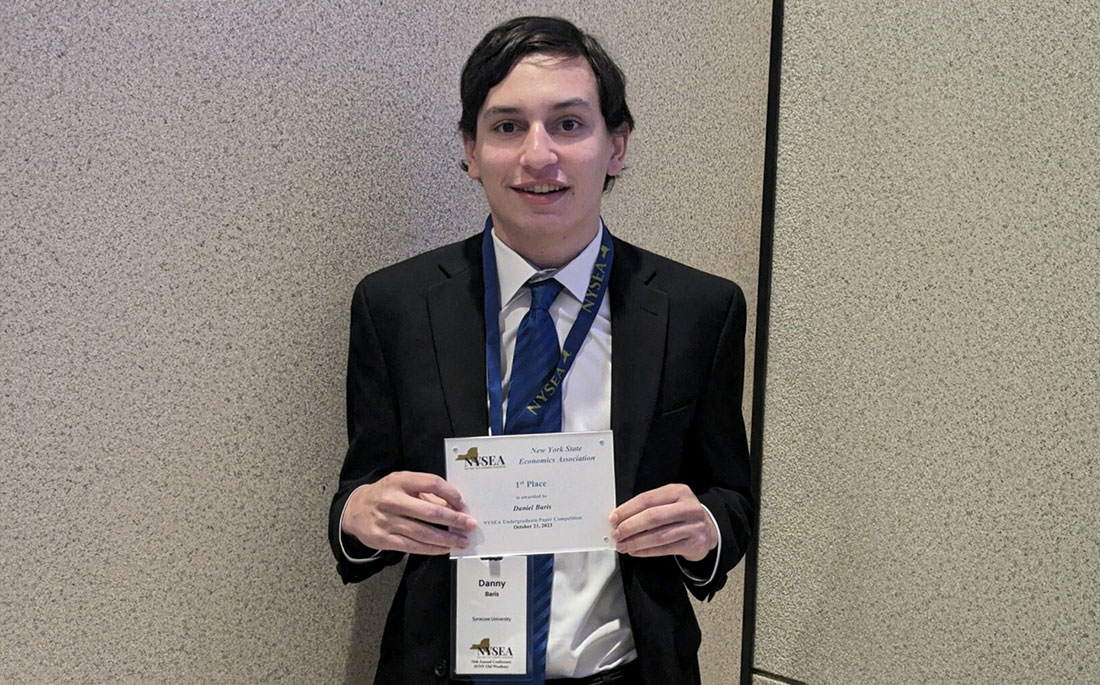
Danny Baris ’26
B.S. Sport Analytics
Danny Baris ’26 won the student paper competition at the New York State Economics Association annual conference in October 2023 in Old Westbury, New York, where he presented his research, “Promotions and United States Hockey League Attendance,” under the guidance of Professor Rodney Paul.
“As someone who enjoys attending sports games, the topic of promotions is of great interest to me. For my paper, I wrote about the effects of various types of gameday promotions on attendance for minor league hockey. Through this project, I was able to gain valuable experience conducting a study, writing a research paper, and presenting my findings.
“My findings could be used to help teams set their promotions schedules in ways that maximize revenue. Future research could examine the effects of promotions in other sports leagues. Along with some other students, I am currently working on a project surrounding the effects of promotions across minor league baseball.”
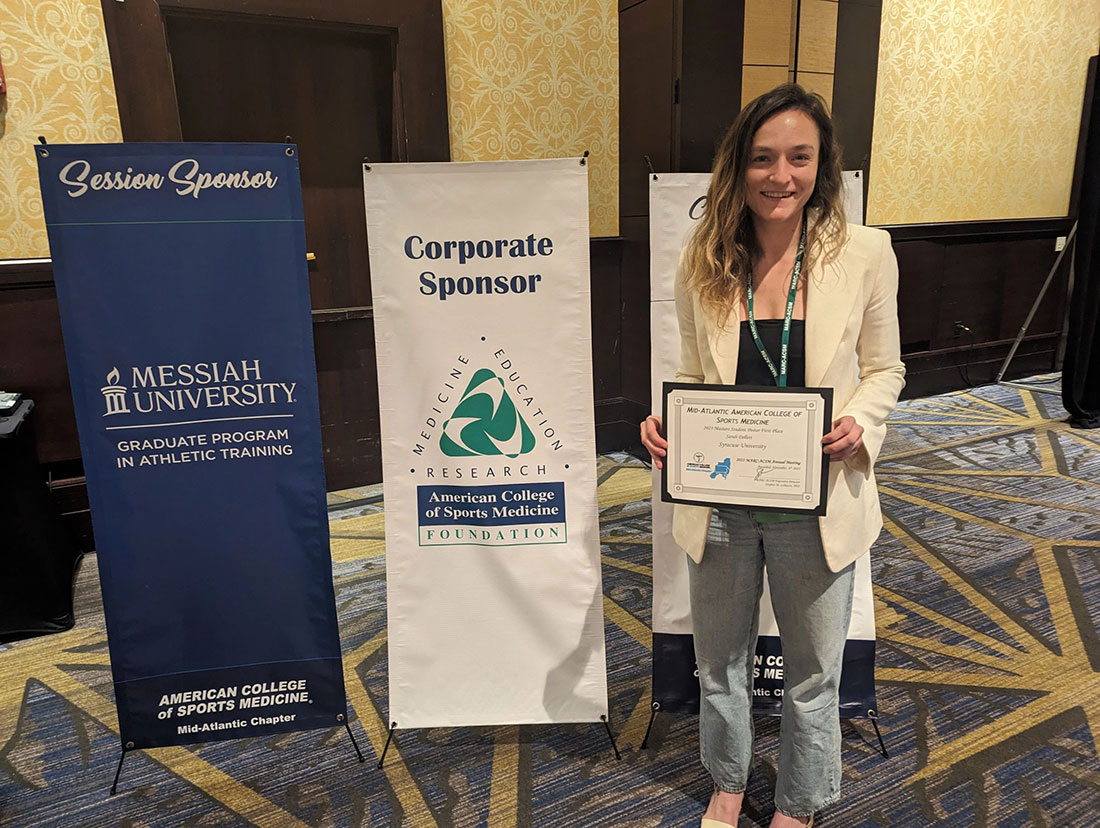
Sarah Dellett
M.A. Nutrition Science
Sarah Dellett received first prize among students in master’s degree programs at the Mid-Atlantic region of the American College of Sports Medicine annual meeting in November 2023 for her research “Prevalence of and Reasons for Dietary and Supplementation Habits Among Physically Active College Students,” under the guidance of Professor Jessica Garay. Through Sarah’s work in Professor Latha Ramalingam’s Nutrigenomic Lab, where she studies metabolic improvements and genetic differences with omega-3 supplementation, Sarah discovered her ambition to become a clinical researcher in the wide field of nutrition science.
“I loved my statistics and research methods class during my first year and wanted to further hone my analytical skills using R Studio. I linked up with Dr. Garay over the summer to explore her dataset collected on athletes in fall 2020. She helped me critically think through the methodology and correctly describe statistical results for my presentation.
“I found my passion for this project as I’m interested in how sustainable, plant-based diets can be a balanced diet for athletes. This research showed unique developments within vegetarianism, as the most common reason for adopting a vegetarian diet among this cohort is environmental, rather than animal rights reasons. We also found that the vegetarian group had a higher level of nutrition knowledge and had supplementation habits that reflected an understanding of their need to supplement with Vitamin B12 and iron, commonly deficient in vegetarians.”

Mingxuan (Jessica) Li
Master of Public Health
In November 2023, Mingxuan (Jessica) Li attended the American Public Health Association annual meeting in Atlanta, Georgia, where she accepted the Public Health Education and Health Promotion Student Award on behalf of her fellow students, Michelle Asiedu-Danso and Matthew Scrape. There, Jessica, Michelle, and Matthew were recognized for their research, “Prostate Cancer Screening and Treatment in New York State: A Content Analysis of Articles Published by Newspapers Focusing on People of Color,” completed under the guidance of Professor Bernard Appiah.
“Our goal of this study is to understand how newspapers for people of color discuss prostate cancer, examining both risk factors and media representation. We identified a significant gap in news coverage for people of color on this crucial health issue. Our mission was not just to point out the issues but also to find ways to better share information about prostate cancer in these communities.
“It was a moment of immense honor and pride when standing as the first author and presenter of our project in Atlanta. As we shared our findings and engaged with fellow researchers during the conference, we realized there are potential impacts that our work could have in raising awareness, fostering informed discussions, and shaping future research directions in prostate cancer. We hope our work has positive impacts not only on academic discourse but also inspires ongoing efforts to bridge communication gaps and champion health equity for all.”
When 2 > 3

When the NBA celebrated the start of its 75th season in the Fall of 2021, it was clear that the 3-point shot adopted by the league in 1979-80 had transformed the sport.
The number of attempts beyond the arc had increased in the each of the previous 10 seasons, from 22.2% in 2010-11 to 39.2% in 2020-21, and it had been nearly five years since a team won a game without making at least one 3-pointer (that streak is now up to eight years). Led by 3-point specialists Steph Curry and Klay Thompson, the Golden State Warriors had won three of the previous seven NBA titles and were about to win a fourth in 2022.
It appeared the 3-point revolution would never end. But a recent study by Falk College sport analytics Professor Shane Sanders and Associate Professor Justin Ehrlich shows that while the number of 3-point shots continues to increase, the average expected value of 3-pointers has become less than 2-pointers since the 2017-18 season.
“When taking fouled shots and made free throws into consideration, we found that what had long been a premium for the 3-point shot started to become a dispremium in the 2017-18 season and that trend is continuing,” Ehrlich says. “The implication of these findings is enormous in terms of potential impact on roster construction and offensive philosophies.”
The research preprint from Sanders and Ehrlich, called “Estimating NBA Team Shot Selection Efficiency from Aggregations of True, Continuous Shot Charts: A Generalized Additive Model Approach,” is available through the Social Science Research Network website. Sanders and Ehrlich will present their paper as one of seven finalists in the research competition at the NBA-centric MIT Sloan Sports Analytics Conference March 1-2 in Boston.
“In past conferences, there has been a lot of discussion among NBA executives about how basketball analytics created the 3-point ‘moneyball’ era of basketball and how this has impacted the popularity of the game,” Sanders says. “Perhaps ironically, our research uses basketball analytics, along with a fully specified team offensive objective function, to say there is now too much 3-point shooting for a point-maximizing offense.”
To conduct their research, Sanders and Ehrlich developed a new shot chart that uses a generalized additive model (GAM) to estimate total shot proficiency continuously in the half-court. Their shot chart incorporates missed shots that draw a shooting foul – and shot-pursuant free throw scoring – to determine total scoring yield following a shot decision.
Current expected value formulas fall short by not including this additional information, which, when combined with the outcome of the initial shot attempt, result in what Sanders and Ehrlich call “true point value” of a shot.
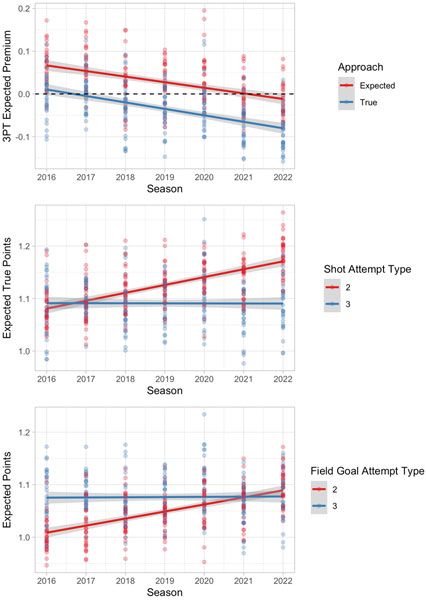
True Value from 3P shot attempts=1.094
(2022-23 NBA season)And even when not factoring in free throws, the researchers found that the expected value from 3-point shots are now worth less than 2-point shots:
Expected value from 2P field goal attempt=2P% * 2 = .548 * 2= 1.096
Expected value from 3P field goal attempt=3P% * 3 = .361 * 3= 1.083
(2022-23 NBA season)
According to this research, the expected value from average 2-point field goal attempts (FGA) is now worth 0.013 points more than average 3-point FGA, even before factoring in shot-pursuant free throw scoring. In other words, if you multiply the probability of making a 3-point FGA times the value of a 3-point FGA, it’s worth less than if you multiple a 2-point FGA times the value of a 2-point FGA.
When discussing true point value, the researchers use the term “shot attempts” instead of “field goal attempts” because their formula includes missed shots when a player is fouled, which is not included in standard field-goal attempt statistics. So, when including made and missed free throws, the disparity based on this new true value metric is even greater as average 2-point shot attempts are now worth 0.087 more points than 3-point shot attempts.
Officials from NBA teams and the league have discussed moving the 3-point line back from its current distance of 23 feet, 9 inches (22 feet in the corners). But as this study shows, the value of a 3-pointer is decreasing at the current distance, and teams are already starting to alter their shot selection to emphasize more high-percentage 2-point shots.
“These research findings do not coincide completely with the unresearched musings of NBA analysts Charles Barkley and Shaquille O’Neal,” Sanders says. “For example, our findings do not suggest that such perimeter stars as Stephen Curry or Damian Lillard should not shoot a lot of threes.
“It means marginal stretch fours and other marginal outside shooters should not pull up for a 3 as often and that some marginal outside shooters should not extend their range to 25-26 feet or more,” Sanders says. “Players can still achieve the offensive spacing benefits of positioning on the perimeter without some players shooting from there quite as often.”
Joining the Team
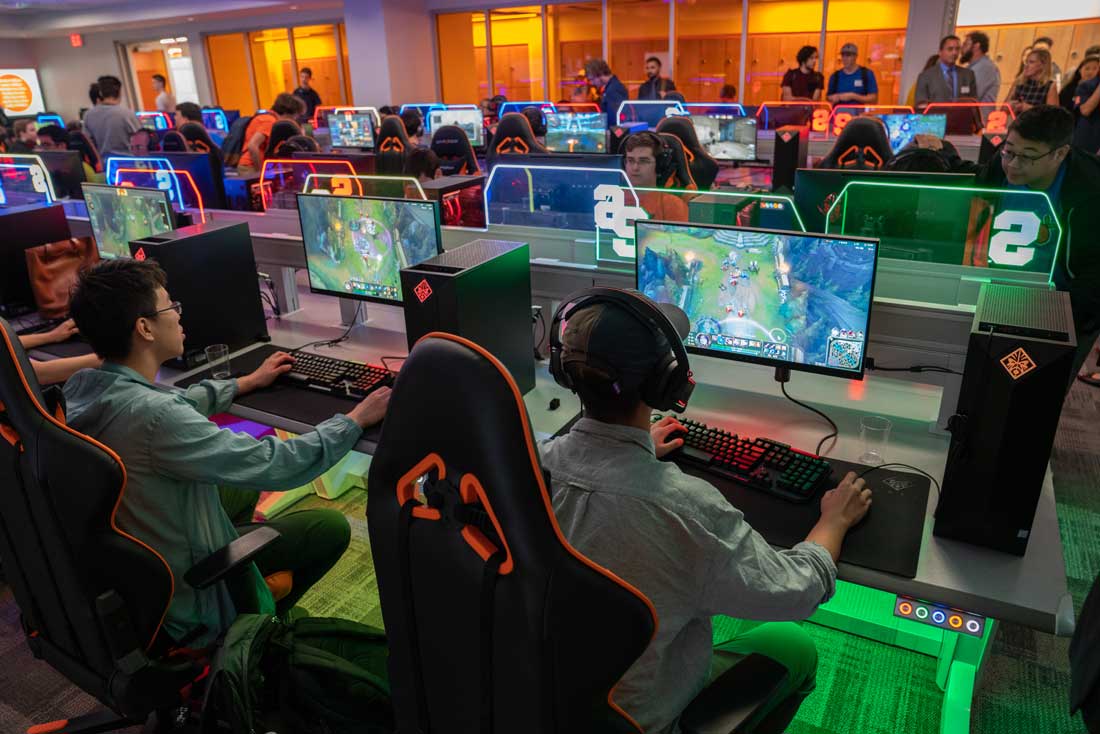
Joey Gawrysiak, executive director of the esports communications and management degree program, has announced the appointment of three new staff members to the program: Nikita Bair, Sean Kelly and Travis Yang”
The new esports communications and management program, which was announced in March 2023, will be offered jointly by the S.I. Newhouse School of Public Communications and the David B. Falk College of Sport and Human Dynamics, in addition to new varsity competitive teams under Student Experience. The University will start enrolling students in the fall. These new staff members will help further develop and amplify the offerings of the program.
“We are fortunate enough to bring in some of the top talent, with the most experience in all of collegiate esports, to support the growth and expansion of the esports program here at Syracuse University,” says Gawrysiak. “We will be able to offer a diverse set of programming across different areas of esports and gaming that no other university can offer. I can’t wait to get to work with this group of talented individuals so we can build an exciting and beneficial program for our current and future learners that truly goes beyond gaming.”
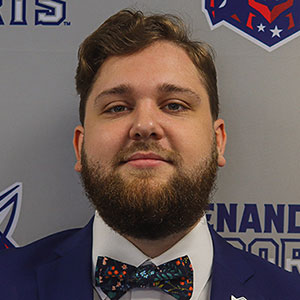
Nikita Bair
Bair has been named the esports program manager. Having helped found the first varsity esports program in New England at Northeastern University in Boston, Massachusetts, Bair also led one of the oldest esports degree programs at Shenandoah University, where he was a full-time faculty and coordinator of esports. At Syracuse, Bair will focus on academic endeavors, securing partnerships, internships, and travel abroad, while preparing learners for post-graduation by providing ample experiential learning and professional development opportunities for students.
Bair earned a master of business administration in 2023 from Shenandoah University and a bachelor of science in economics and finance in 2021 from Northeastern University. In his studies, Bair specialized in esports and global affairs, earning a concentration in esports from Shenandoah University and a minor in international affairs from Northeastern University.
“The University-wide esports initiative, spearheaded by Chancellor Kent Syverud, speaks volumes to Syracuse’s commitment to becoming a leader in the academic esports landscape,” says Bair. “I am incredibly grateful to have the opportunity to support the leading esports learners and provide them with the most robust academic esports offerings in the nation. With our team, the students and support from the University, I have no doubt in saying that the space is going to see a lot more Orange very soon.”
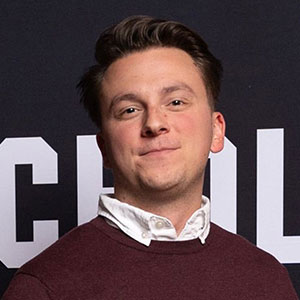
Sean Kelly
Kelly, the newly appointed director of production and outreach, is a leader in the collegiate esports space when it comes to broadcast production. He has led such major projects such as Activision Blizzard’s Calling All Heroes, Behaviour’s Dead by Daylight Mobile: Nights of Terror, and Boost on the Beach, an annual award-winning event. At Syracuse, Kelly will continue pushing the boundaries of what is considered the gold standard in collegiate esports production.
Kelly graduated from Shenandoah University in May 2022 with a bachelor of science in esports management and a bachelor of business administration degree. He brings a wealth of knowledge and experience to further expand Syracuse University’s esports offerings.
“The holistic approach and ‘all-in’ mentality that Syracuse University has toward the esports program and greater industry is going to lead to amazing developments,” says Kelly. “Syracuse esports is going to be a pivotal player in moving collegiate esports forward and I am excited to be a part of the team from the start. My goal is to take esports production and content creation to a whole new level through student-led projects and industry partners. The sky is the limit for Joey, Nikita, Travis and I!”
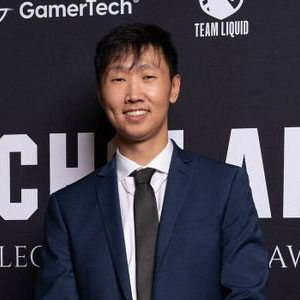
Travis Yang
Yang has been named the director of competition. He got his start in collegiate esports as the assistant esports coach for Ashland University, then one of the first 60 esports programs in the country. He transitioned to the head esports coach for Texas A&M University-San Antonio where he developed the first esports program in the Texas A&M system and the city of San Antonio. Prior to Syracuse, Yang served as the director of esports for Wichita State University, providing oversight for a comprehensive esports program focused on academic and competitive outcomes.
Yang received a bachelor of science degree in parks, recreation and tourism from the University of Missouri and is completing a master of education degree in sport management from Wichita State University.
“The commitment from the University toward a comprehensive esports ecosystem speaks volumes to the vision and belief of the institution in the transformative power of this emerging field,” says Yang. “I am honored to join Syracuse and to have the opportunity to build a competitive program that will holistically develop students while competing at a national level I look forward to hitting the ground running and working closely with Joey, Sean and Nikita as we spearhead esports on campus and advance the potential of esports across the country.”
An SU Story by Christine Grabowski originally published on Feb. 7, 2024.
New Dean for Research
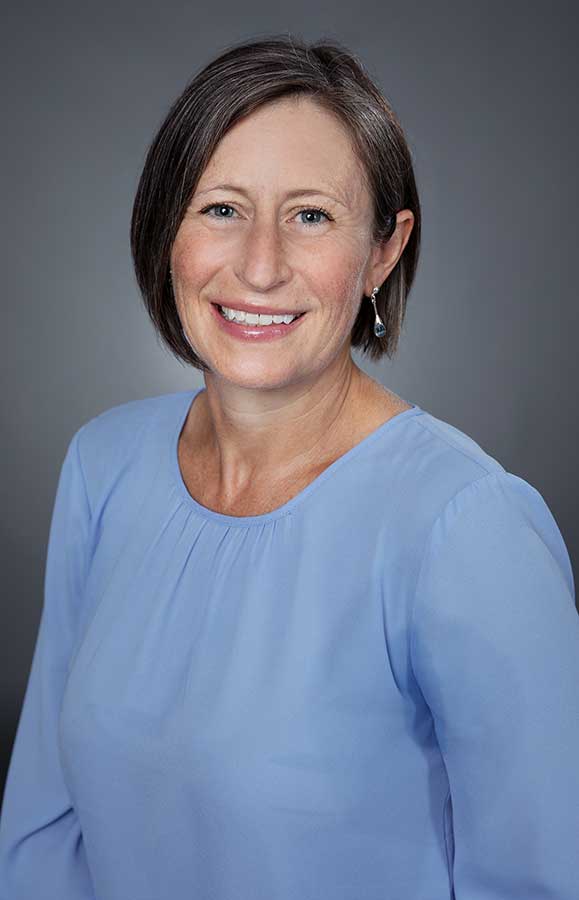
Katherine (Katie) McDonald, Ph.D., has been appointed Senior Associate Dean for Research and Administration in Falk College. As Senior Associate Dean, McDonald is responsible for the oversight of research, administration, and support for faculty; the supervision of the Falk College Office of Research Development; the development and implementation of Falk strategic initiatives; and representing Falk College on University-level committees as appropriate. The office reports directly to Falk College Dean Jeremy Jordan.
“Falk College research spans a wide range of disciplines with impactful, practical applications in individual health and community wellbeing,” Jordan says. “Thanks to Dr. McDonald’s leadership and her team in the Falk College Office of Research Development, the College has experienced steady growth in research activity by every measure, including grant funding, publishing, interdisciplinary collaborations, and student engagement. I am eager to see her influence expand as Senior Associate Dean for Research and Administration.”
McDonald’s new appointment follows a three-year appointment as Associate Dean of Research. During her tenure, McDonald worked collaboratively to establish programming to nurture faculty research, enhance connections on campus to fuel interdisciplinary research, and develop policy to foster research success.
“I am delighted to continue to serve Falk College in this new role,” says McDonald. “Falk College is home to students, staff, and faculty committed to creating and leveraging scientific discoveries to enhance human thriving. It is an honor to have the opportunity to work with so many talented people to co-chart our future.”
McDonald is a professor in the Falk College Department of Public Health, where she also served as chair from 2018 to 2020. She is a fellow of the American Association on Intellectual and Developmental Disabilities, chair of Syracuse University’s Institutional Review Board, and a member of the Editorial Board for Autism in Adulthood. At Syracuse University, she holds faculty affiliations in the Aging Studies Institute, the Burton Blatt Institute, the Consortium for Culture and Medicine, and the Disability Studies program.
As a scholar, McDonald uses socioecological theory and community-engaged research to understand and promote the inclusion of individuals with disabilities. She has made significant contributions to research in disability, health disparities, community-engaged research, and ethical, legal, and social issues in research. Her research has been supported by grant funding from the National Institutes of Health, U.S. Department of Education, the National Institute on Disability, Independent Living, Rehabilitation Research, and the Patient Centered Outcomes Institute, among others. She is published in leading journals such as the Disability and Health Journal, American Journal of Bioethics, and the American Journal on Intellectual and Developmental Disabilities.
She received a B.S. with distinction in human development and family studies with a minor in French from Cornell University and a Ph.D. in community and prevention research psychology with a minor in statistics, methods, and measurements from the University of Illinois at Chicago.
Supporting Student Experience
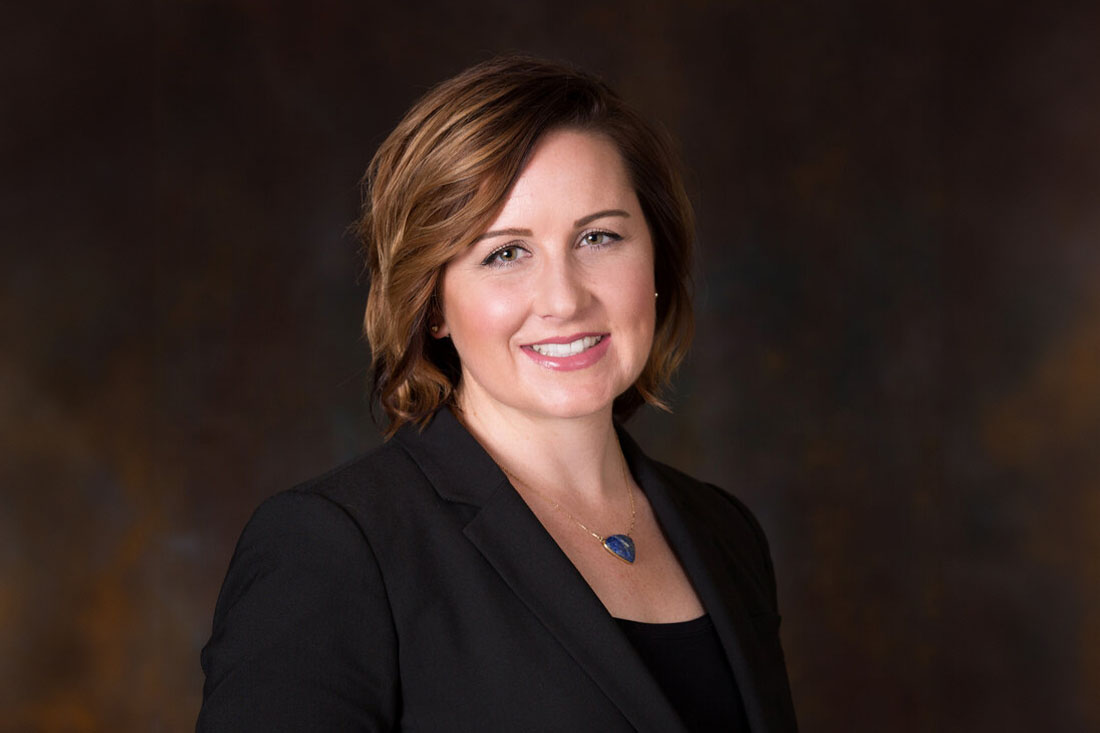
Megan Myers has been named Falk College Assistant Dean of Advancement effective March 1, 2024. Myers will report to Dean Jeremy Jordan and lead all Falk College advancement efforts working closely with the Syracuse University Office of Advancement and External Affairs (AEA).
Myers joined Falk College’s advancement team as assistant director of development in December 2018 and was promoted to director of development in December 2021. In these roles, Myers successfully managed an assigned donor portfolio, established and managed relationships with Falk College alumni and donors, and collaborated with Syracuse University’s regional fundraising program.
“Megan has an exceptional history of success in creating new strategic partnerships and developing alumni engagement with Falk College,” says Falk College Dean Jeremy Jordan. “From new signature programs to targeted student support funds, Megan’s contributions have meaningfully advanced this College. I am confident that under her leadership we will continue to enrich the student experience.”
Prior to joining Falk, Myers was a development associate in AEA and highly successful as part of the inaugural Development Associate Team established as part of the planning for prospective donor development in the Forever Orange Campaign.
“I am thrilled to have the privilege to support Dean Jordan and advance his vision for the future for Falk College,” says Myers. “I look forward to continuing to build upon the excellent work my predecessor Dave Salanger has already initiated for the College by further developing relationships with alumni, parents, and friends of Syracuse University that create new opportunities for students and faculty.”
Myers previously worked as a development specialist with the Alzheimer’s Association, Nebraska Chapter, where she managed community-based, volunteer-driven events. In her professional career, she held positions with KLKN-TV in Lincoln, Nebraska, serving as a promotions manager and earning recognition as an Emmy-nominated reporter/anchor. She also contributed as an anchor for the weekend news at KEVN-TV in Rapid City, South Dakota, where she played a key role in achieving notable viewer market ratings.
She recently earned a master of public health from Syracuse University and holds a bachelor of arts in broadcast journalism and sociology from The Pennsylvania State University, where she was an Academic All-American and team co-captain for the women’s swimming and diving team.
Myers succeeds David Salanger, who will retire in March 2024. Salanger served 20 years at Syracuse, 18 of those with Falk College. During that time, he made a transformative impact on Falk College through alumni engagement, strategic partnerships, and critical financial gifts.
Among his contributions, Salanger was instrumental in guiding the generous gift from David B. Falk ’72 and Rhonda S. Falk ’74 that named the College in 2011. In addition, he secured the financial support for the renovation of Falk College Complex, previously the College of Law, in 2015. In the course of his service, Salanger raised over $40 million for the University and Falk College.
Page 8 of 37
